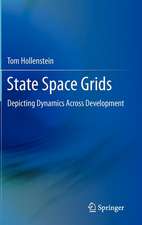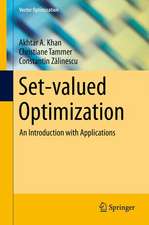Markov Networks in Evolutionary Computation: Adaptation, Learning, and Optimization, cartea 14
Editat de Siddhartha Shakya, Roberto Santanaen Limba Engleză Paperback – 9 mai 2014
This book focuses on the different steps involved in the conception, implementation and application of EDAs that use Markov networks, and undirected models in general. It can serve as a general introduction to EDAs but covers also an important current void in the study of these algorithms by explaining the specificities and benefits of modeling optimization problems by means of undirected probabilistic models.
All major developments to date in the progressive introduction of Markov networks based EDAs are reviewed in the book. Hot current research trends and future perspectives in the enhancement and applicability of EDAs are also covered. The contributions included in the book address topics as relevant as the application of probabilistic-based fitness models, the use of belief propagation algorithms in EDAs and the application of Markov network based EDAs to real-world optimization problems. The book should be of interest to researchers and practitioners from areas such as optimization, evolutionary computation, and machine learning.
| Toate formatele și edițiile | Preț | Express |
|---|---|---|
| Paperback (1) | 985.35 lei 6-8 săpt. | |
| Springer Berlin, Heidelberg – 9 mai 2014 | 985.35 lei 6-8 săpt. | |
| Hardback (1) | 989.96 lei 6-8 săpt. | |
| Springer Berlin, Heidelberg – 20 apr 2012 | 989.96 lei 6-8 săpt. |
Din seria Adaptation, Learning, and Optimization
- 15%
 Preț: 641.71 lei
Preț: 641.71 lei - 15%
 Preț: 634.32 lei
Preț: 634.32 lei - 20%
 Preț: 983.85 lei
Preț: 983.85 lei - 20%
 Preț: 648.44 lei
Preț: 648.44 lei - 20%
 Preț: 2196.22 lei
Preț: 2196.22 lei - 20%
 Preț: 984.18 lei
Preț: 984.18 lei - 20%
 Preț: 653.38 lei
Preț: 653.38 lei - 20%
 Preț: 648.59 lei
Preț: 648.59 lei - 15%
 Preț: 640.37 lei
Preț: 640.37 lei - 20%
 Preț: 649.43 lei
Preț: 649.43 lei - 20%
 Preț: 651.42 lei
Preț: 651.42 lei - 18%
 Preț: 1837.57 lei
Preț: 1837.57 lei - 20%
 Preț: 646.62 lei
Preț: 646.62 lei - 20%
 Preț: 927.45 lei
Preț: 927.45 lei - 20%
 Preț: 651.75 lei
Preț: 651.75 lei - 20%
 Preț: 646.47 lei
Preț: 646.47 lei - 20%
 Preț: 986.66 lei
Preț: 986.66 lei - 20%
 Preț: 638.55 lei
Preț: 638.55 lei - 20%
 Preț: 983.39 lei
Preț: 983.39 lei - 20%
 Preț: 991.14 lei
Preț: 991.14 lei - 15%
 Preț: 638.57 lei
Preț: 638.57 lei - 15%
 Preț: 640.88 lei
Preț: 640.88 lei - 20%
 Preț: 637.23 lei
Preț: 637.23 lei - 20%
 Preț: 1449.13 lei
Preț: 1449.13 lei - 20%
 Preț: 1284.47 lei
Preț: 1284.47 lei - 20%
 Preț: 985.35 lei
Preț: 985.35 lei
Preț: 985.35 lei
Preț vechi: 1231.69 lei
-20% Nou
Puncte Express: 1478
Preț estimativ în valută:
188.55€ • 197.52$ • 156.26£
188.55€ • 197.52$ • 156.26£
Carte tipărită la comandă
Livrare economică 08-22 aprilie
Preluare comenzi: 021 569.72.76
Specificații
ISBN-13: 9783642444944
ISBN-10: 3642444946
Pagini: 264
Ilustrații: XX, 244 p.
Dimensiuni: 155 x 235 x 14 mm
Greutate: 0.37 kg
Ediția:2012
Editura: Springer Berlin, Heidelberg
Colecția Springer
Seria Adaptation, Learning, and Optimization
Locul publicării:Berlin, Heidelberg, Germany
ISBN-10: 3642444946
Pagini: 264
Ilustrații: XX, 244 p.
Dimensiuni: 155 x 235 x 14 mm
Greutate: 0.37 kg
Ediția:2012
Editura: Springer Berlin, Heidelberg
Colecția Springer
Seria Adaptation, Learning, and Optimization
Locul publicării:Berlin, Heidelberg, Germany
Public țintă
ResearchCuprins
From the content: Probabilistic Graphical Models and Markov Networks.- A review of Estimation of Distribution Algorithms and Markov networks.- MOA - Markovian Optimisation Algorithm.- DEUM - Distribution Estimation Using Markov Networks.- MN-EDA and the use of clique-based factorisations in EDAs.- Convergence Theorems of Estimation of Distribution Algorithms.- Adaptive Evolutionary Algorithm based on a Cliqued Gibbs Sampling over Graphical Markov Model Structure.
Textul de pe ultima copertă
Markov networks and other probabilistic graphical modes have recently received an upsurge in attention from Evolutionary computation community, particularly in the area of Estimation of distribution algorithms (EDAs). EDAs have arisen as one of the most successful experiences in the application of machine learning methods in optimization, mainly due to their efficiency to solve complex real-world optimization problems and their suitability for theoretical analysis.
This book focuses on the different steps involved in the conception, implementation and application of EDAs that use Markov networks, and undirected models in general. It can serve as a general introduction to EDAs but covers also an important current void in the study of these algorithms by explaining the specificities and benefits of modeling optimization problems by means of undirected probabilistic models.
All major developments to date in the progressive introduction of Markov networks based EDAs are reviewed in the book. Hot current research trends and future perspectives in the enhancement and applicability of EDAs are also covered. The contributions included in the book address topics as relevant as the application of probabilistic-based fitness models, the use of belief propagation algorithms in EDAs and the application of Markov network based EDAs to real-world optimization problems. The book should be of interest to researchers and practitioners from areas such as optimization, evolutionary computation, and machine learning.
This book focuses on the different steps involved in the conception, implementation and application of EDAs that use Markov networks, and undirected models in general. It can serve as a general introduction to EDAs but covers also an important current void in the study of these algorithms by explaining the specificities and benefits of modeling optimization problems by means of undirected probabilistic models.
All major developments to date in the progressive introduction of Markov networks based EDAs are reviewed in the book. Hot current research trends and future perspectives in the enhancement and applicability of EDAs are also covered. The contributions included in the book address topics as relevant as the application of probabilistic-based fitness models, the use of belief propagation algorithms in EDAs and the application of Markov network based EDAs to real-world optimization problems. The book should be of interest to researchers and practitioners from areas such as optimization, evolutionary computation, and machine learning.
Caracteristici
Offers a systematic presentation of the use of Markov Networks in Evolutionary Computation Fills a void in the current literature on the application of PGMs in evolutionary optimization Written by leading experts in the field













